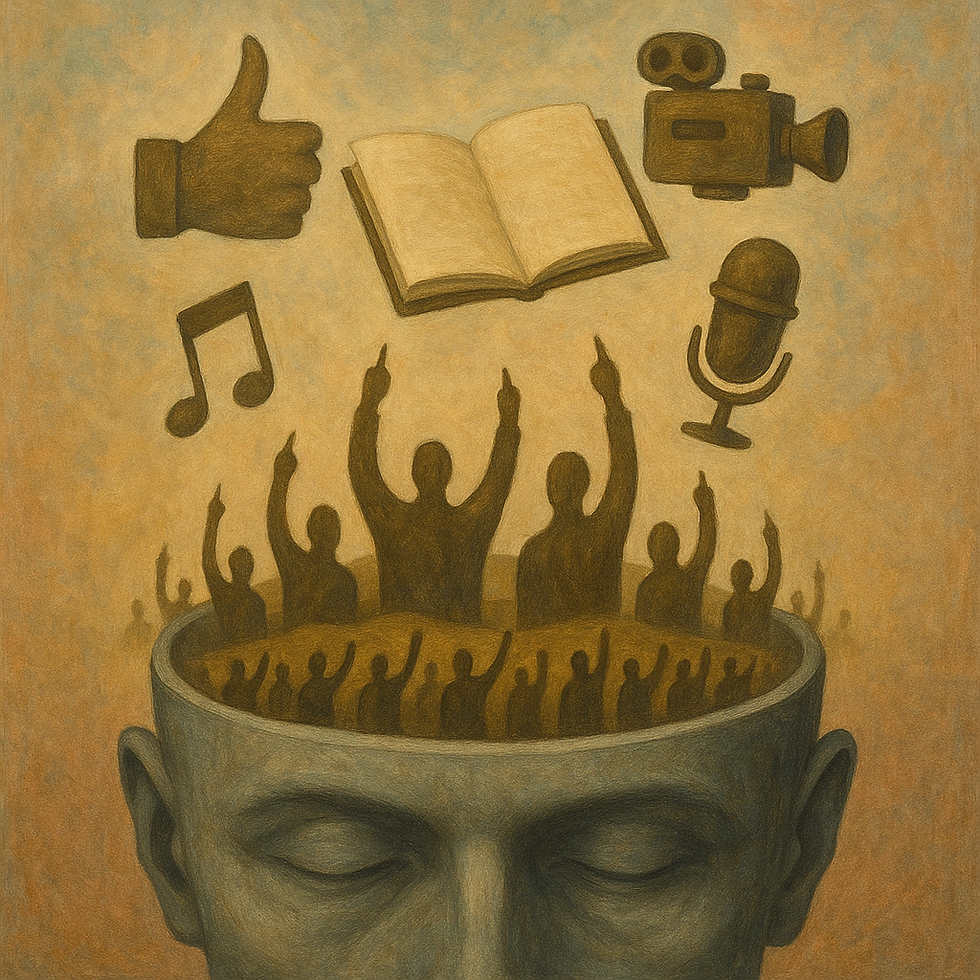The Rise of Mediocrity and the Price of Digital Culture | A Critique in the Light of Andrew Keen
- Jul 2, 2025
- 4 min read
R. Görkem Çatal

The innovations brought into our lives by the digital age are often discussed alongside positive notions such as “freedom,” “accessibility,” and “democratization.” However, behind this glittering rhetoric lies a serious risk of quality erosion and cultural dissolution.
One thinker who warns about this danger is Andrew Keen, who in his 2007 work The Cult of the Amateur: How Today’s Internet is Killing Our Culture analyzes the phenomenon of the “rise of mediocrity” as a cultural collapse triggered by the Internet.[1]
The Rise of the “Culture of Amateurism”
According to Keen, while the Internet may appear to democratize cultural production by placing the tools of creation in everyone’s hands, it actually nullifies expertise and quality. In this environment, everyone can be a producer—but not everyone’s production is equally qualified. Keen explains this by stating:
“We are replacing the tyranny of the elite with the tyranny of the amateur.”[2]
Thus, as society dismantles elitism, it simultaneously loses meritocracy and authority grounded in knowledge.
Popularity Over Quality
In digital media, value is no longer measured by informational or aesthetic quality but by attention-grabbing potential and virality. Keen critiques this shift, asserting:
“When anyone can be a filmmaker, musician, or journalist, the value of these roles is diminished.”[3]
In other words, as anyone can step onto the stage, the professional prestige of fields like art, journalism, or academia is overshadowed. In a world where everyone can express their “own truth,” objective reality and collective expertise gradually lose their footing.
Information Pollution and Erosion of Truth
On the Internet, everyone can publish content, but the accuracy, source reliability, and contextual validity of that content are often questionable. This amplifies information pollution and makes the perception of truth more difficult. Keen cautions:
“The internet is not the great democratizer—it is the great eroder of truth and trust.”[4]
This leads not only to widespread exposure to misinformation but also to a dwindling desire for accessing accurate, well-researched information. In a world where everything seems equal, critical filtering reflexes deteriorate.
Social Consequences of the Digital Age
Keen argues that digital culture harms not only information but also the individual–society relationship. Because digital culture produces an environment where individuals relish their own voices while devaluing others'. He states:
“Blogs have become the blind leading the blind.”[5]
This analogy highlights how social media and blogging cultures are often filled with unfiltered, unchecked, and biased opinions. Moreover, in such an environment, the loudest voice is often accepted as the truest, weakening collective intelligence.
The Cult of the Amateur exposes how the creative freedom offered by the Internet can transform into cultural destruction when severed from responsibility and quality. Keen’s warning is not hostility toward technology but a sane audit of the digital age.
Keen’s thesis, though controversial, initiates a broader philosophical inquiry into the relationship between technological empowerment and cultural authority. The issue is not freedom of expression per se, but the absence of critical oversight and epistemic standards. This echoes José Ortega y Gasset’s critique in The Revolt of the Masses, in which he warns of the danger posed by the crowd invading cultural institutions without understanding their function. Keen’s adaptation of this critique to the digital era reintroduces the modern tension between individual freedom and social responsibility. Transferring creative power entirely to the masses risks collapsing the intellectual ecosystems that sustain culture.
More strikingly, The Cult of the Amateur anticipated today’s “post-truth culture” years before terms like Instagram, TikTok, or algorithmic content policies emerged. The book describes, with astonishing clarity, the destructive effect of these trends on information. Viewed in this light, Keen’s work is not only a critique of Web 2.0 but also a foundational text for understanding the cultural consequences of digital populism. If everyone can be a publisher, curator, and commentator, distinguishing truth from noise becomes nearly impossible. Keen’s implicit message is not a return to elitism but a plea for renewed appreciation of curation, discernment, and “slow knowledge.” His message is at once cautionary and hopeful: without critical mediation, the digital tools that promise freedom may ultimately drown us in our own noise.
Resonances in the Turkish Context
These critiques strongly resonate in the Turkish context as well. With the rise of social media, individuals with no professional or academic credentials are increasingly regarded as “authorities” simply because they generate captivating content. Platforms like Twitter (X), YouTube, and TikTok have given rise to a profound knowledge crisis.
Content produced meticulously by academics or journalists often gets overshadowed by impulsive, sensational posts. This does not only impact individual information levels but also undermines public discourse and democratic decision-making. In Turkey, especially in fields like economics, health, and education, the rise of “social media expertise” epitomizes the mediocrity Keen warns against. In this new media ecosystem, meritocratic voices are silenced, replaced by content creators chasing engagement rather than truth—fostering a cultural climate where public reasoning is supplanted by mediocrity.
Now more than ever, we must ask the critical question:
“In a world where every voice is deemed equal, how will the voice of meaning be heard?”
Bibliography
Keen, A. (2007). The Cult of the Amateur: How Today’s Internet is Killing Our Culture. Doubleday/Currency.
Ibid., p. 15.
Ibid., p. 34.
Ibid., p. 47.
Ibid., p. 59.
-2.png)